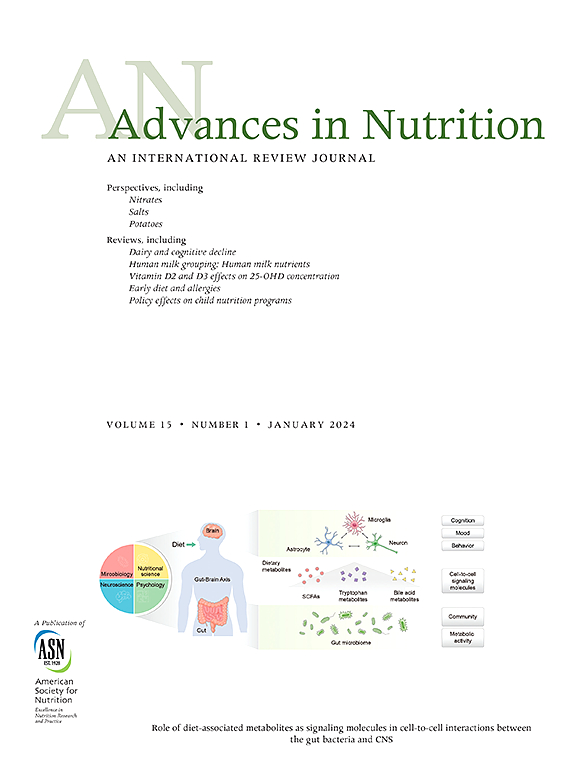Best Practices and Considerations for Conducting Research on Diet–Gut Microbiome Interactions and Their Impact on Health in Adult Populations: An Umbrella Review
IF 9.2
1区 医学
Q1 NUTRITION & DIETETICS
引用次数: 0
Abstract
Diet modulates gut microbiome composition and function. However, determining causal links between diet–gut microbiome interactions and human health is complicated by inconsistencies in the evidence, arising partially from variability in research methods and reporting. Widespread adoption of standardized best practices would advance the field but require those practices to be identified, consolidated, and discussed. This umbrella review aimed to identify recommended best practices, define existing gaps, and collate considerations for conducting research on diet–gut microbiome interactions and their impact on human health outcomes. Reviews meeting inclusion criteria and published after 2013 were identified using a systematic search. Recommendations, considerations, and gaps relating to the best practices associated with study design, participant selection, dietary intervention/assessment, biological sample collection, and data analysis and reporting were extracted and consolidated. Eight narrative reviews were included. Several general points of agreement were identified, and a recurring theme was that best practices are dependent upon the research aims, outcomes, and feasibility. Multiple gaps were also identified. Some, such as suboptimal diet assessment methods and lack of validated dietary intake biomarkers, are particularly relevant to nutrition science. Others, including defining a “healthy” gut microbiome and the absence of standardized sample and data collection/analysis protocols, were relevant specifically to gut microbiome research. Gaps specific to diet–gut microbiome research include the underrepresentation of microbiome-modulating dietary components in food databases, lack of knowledge regarding interventions eliciting changes in the gut microbiome to confer health benefits, lack of in situ measurement methods, and the need to further develop and refine statistical approaches for integrating diet and gut microbiome data. Future research and cross-disciplinary exchange will address these gaps and evolve the best practices. In the interim, the best practices and considerations discussed herein, and the publications from which that information was extracted provide a roadmap for conducting diet–gut microbiome research.
This trial was registered at PROSPERO as CRD42023437645.
开展饮食-肠道微生物组相互作用及其对成人健康影响研究的最佳实践和注意事项:综述》。
饮食调节肠道微生物组成和功能。然而,确定饮食-肠道微生物群相互作用与人类健康之间的因果关系由于证据的不一致而变得复杂,部分原因是研究方法和报告的差异。广泛采用标准化的最佳做法将推动这一领域的发展,但需要确定、巩固和讨论这些做法。本综述旨在确定推荐的最佳做法,确定现有差距,并整理开展饮食-肠道微生物组相互作用及其对人类健康结果影响研究的考虑因素。通过系统检索确定符合纳入标准并在2013年以后发表的综述。提取并整合了与研究设计、参与者选择、饮食干预/评估、生物样本收集以及数据分析和报告相关的最佳实践相关的建议、考虑因素和差距。包括8篇叙述性综述。确定了几个普遍的共识点,一个反复出现的主题是最佳实践取决于研究目标、结果和可行性。还发现了多个差距。其中一些,如次优饮食评估方法和缺乏有效的饮食摄入生物标志物,与营养科学特别相关。其他问题,包括定义“健康”的肠道微生物组和缺乏标准化的样本和数据收集/分析方案,与肠道微生物组研究特别相关。饮食-肠道微生物组研究的具体差距包括食物数据库中微生物组调节饮食成分的代表性不足,缺乏关于引起肠道微生物组变化以赋予健康益处的干预措施的知识,缺乏原位测量方法,以及需要进一步发展和完善整合饮食和肠道微生物组数据的统计方法。未来的研究和跨学科交流将解决这些差距并发展最佳实践。在此期间,本文讨论的最佳实践和考虑因素,以及从中提取信息的出版物,为开展饮食-肠道微生物组研究提供了路线图。普洛斯彼罗注册:CRD42023437645。
本文章由计算机程序翻译,如有差异,请以英文原文为准。
求助全文
约1分钟内获得全文
求助全文
来源期刊

Advances in Nutrition
医学-营养学
CiteScore
17.40
自引率
2.20%
发文量
117
审稿时长
56 days
期刊介绍:
Advances in Nutrition (AN/Adv Nutr) publishes focused reviews on pivotal findings and recent research across all domains relevant to nutritional scientists and biomedical researchers. This encompasses nutrition-related research spanning biochemical, molecular, and genetic studies using experimental animal models, domestic animals, and human subjects. The journal also emphasizes clinical nutrition, epidemiology and public health, and nutrition education. Review articles concentrate on recent progress rather than broad historical developments.
In addition to review articles, AN includes Perspectives, Letters to the Editor, and supplements. Supplement proposals require pre-approval by the editor before submission. The journal features reports and position papers from the American Society for Nutrition, summaries of major government and foundation reports, and Nutrient Information briefs providing crucial details about dietary requirements, food sources, deficiencies, and other essential nutrient information. All submissions with scientific content undergo peer review by the Editors or their designees prior to acceptance for publication.
 求助内容:
求助内容: 应助结果提醒方式:
应助结果提醒方式:


